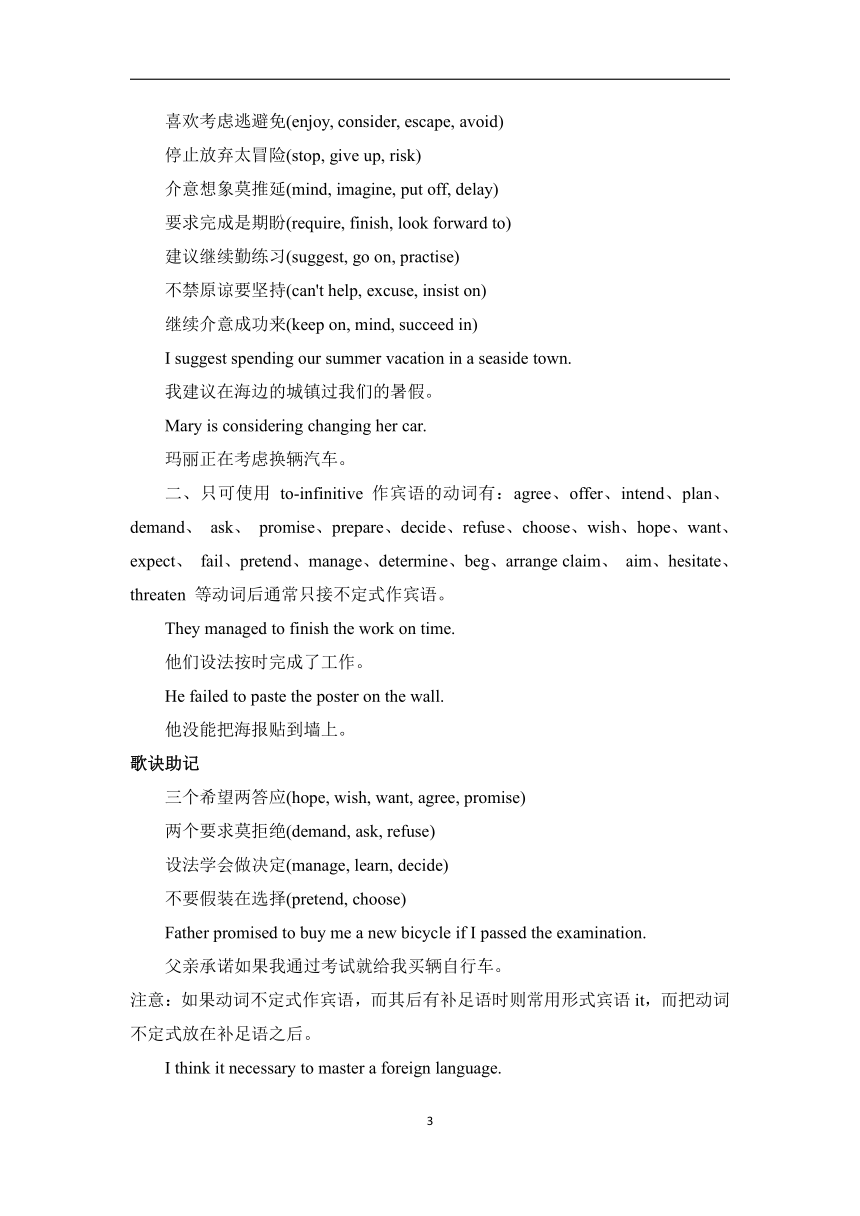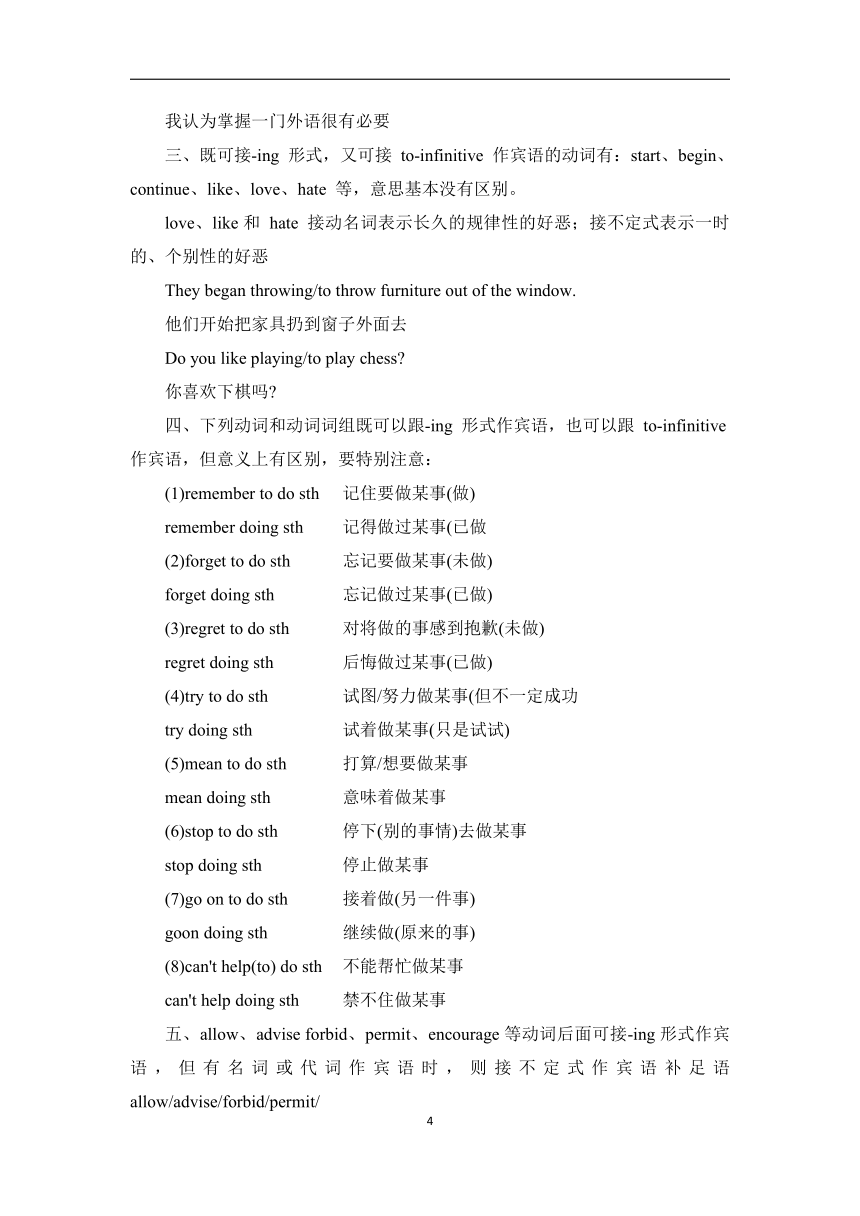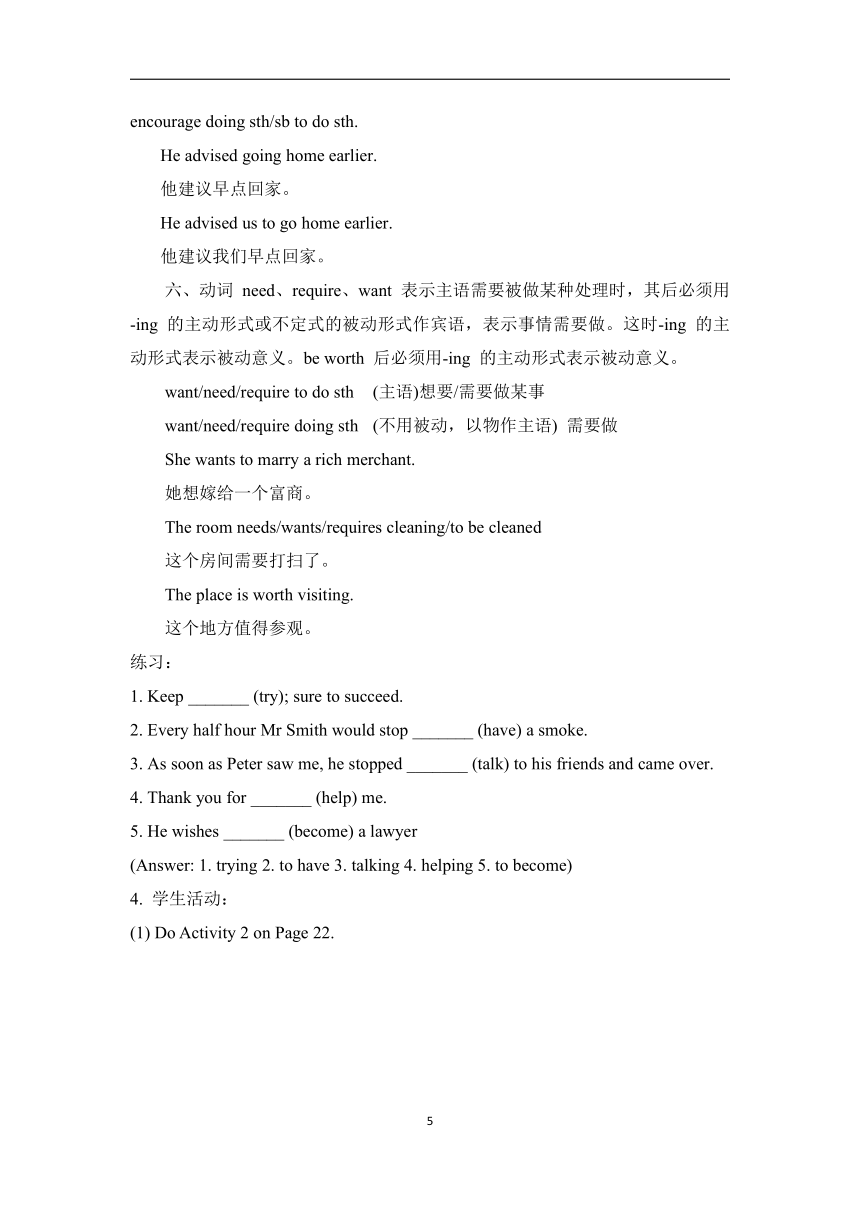外研版(2019)选择性必修第一册Unit 2 Onwards and upwards Using language 教案
文档属性
| 名称 | 外研版(2019)选择性必修第一册Unit 2 Onwards and upwards Using language 教案 |  | |
| 格式 | docx | ||
| 文件大小 | 1.5MB | ||
| 资源类型 | 教案 | ||
| 版本资源 | 外研版(2019) | ||
| 科目 | 英语 | ||
| 更新时间 | 2023-10-24 17:49:48 | ||
图片预览





文档简介
Unit 2 Onwards and upwards
Using language教学设计
科目:英语 课题:Using language 课时:1课时
教学目标与核心素养:
知识目标:Students can learn some new words and basic sentence structures.
能力目标:Students can have a further understanding of the passage.
情感目标:Students can think individually and learn cooperatively.
教学重难点:
教学重点:How to learn the new words and basic sentence structures.
教学难点:How to make students have a better understanding of the passage.
课前准备:多媒体,黑板,粉笔
教学过程:
一、Presentation
1. Greeting
2. Leading-in
教师活动:教师提问。
Have you learned which verbs can use -ing as an object
二、practice
Using Language
1. 学生活动:
Complete Activity 1 on Page 22.
Ask students to look at the sentences and answer the questions:
(Suggested answers: ①Yes, they do. ②No, they don't. ③No, they can't.)
2. 教师活动:
Give enough examples of the usages of -ing and to-infinitive as object.
Guide students to sum up the usages of -ing and to-infinitive as object. Then ask students to give examples
3. 教师活动:语法讲解
-ing and to-infinitive as object动名词的(动词的-ing形式)和动词不定式作宾语
一、只可使用-ing 形式作宾语的动词有:suggest、finish、practise、avoid、miss、delay、like、 enjoy、imagine、deny、admit、consider、escape、risk、mind 等。只接-ing形式的短语有 be used to、can't stand、give up、feel like、keep、on、insist on、look forward to、put off、devote to、stick to、object to、be busy、get down to等。
Do you try to avoid making her annoyed
你是尽力避免惹她生气吗
He admitted taking my money.
他承认拿走了我的钱。
歌诀助记
后接-ing形式的动词和动词短语
喜欢考虑逃避免(enjoy, consider, escape, avoid)
停止放弃太冒险(stop, give up, risk)
介意想象莫推延(mind, imagine, put off, delay)
要求完成是期盼(require, finish, look forward to)
建议继续勤练习(suggest, go on, practise)
不禁原谅要坚持(can't help, excuse, insist on)
继续介意成功来(keep on, mind, succeed in)
I suggest spending our summer vacation in a seaside town.
我建议在海边的城镇过我们的暑假。
Mary is considering changing her car.
玛丽正在考虑换辆汽车。
二、只可使用 to-infinitive 作宾语的动词有:agree、offer、intend、plan、 demand、 ask、 promise、prepare、decide、refuse、choose、wish、hope、want、expect、 fail、pretend、manage、determine、beg、arrange claim、 aim、hesitate、threaten 等动词后通常只接不定式作宾语。
They managed to finish the work on time.
他们设法按时完成了工作。
He failed to paste the poster on the wall.
他没能把海报贴到墙上。
歌诀助记
三个希望两答应(hope, wish, want, agree, promise)
两个要求莫拒绝(demand, ask, refuse)
设法学会做决定(manage, learn, decide)
不要假装在选择(pretend, choose)
Father promised to buy me a new bicycle if I passed the examination.
父亲承诺如果我通过考试就给我买辆自行车。
注意:如果动词不定式作宾语,而其后有补足语时则常用形式宾语it,而把动词不定式放在补足语之后。
I think it necessary to master a foreign language.
我认为掌握一门外语很有必要
三、既可接-ing 形式,又可接 to-infinitive 作宾语的动词有:start、begin、continue、like、love、hate 等,意思基本没有区别。
love、like和 hate 接动名词表示长久的规律性的好恶;接不定式表示一时的、个别性的好恶
They began throwing/to throw furniture out of the window.
他们开始把家具扔到窗子外面去
Do you like playing/to play chess
你喜欢下棋吗
四、下列动词和动词词组既可以跟-ing 形式作宾语,也可以跟 to-infinitive 作宾语,但意义上有区别,要特别注意:
(1)remember to do sth 记住要做某事(做)
remember doing sth 记得做过某事(已做
(2)forget to do sth 忘记要做某事(未做)
forget doing sth 忘记做过某事(已做)
(3)regret to do sth 对将做的事感到抱歉(未做)
regret doing sth 后悔做过某事(已做)
(4)try to do sth 试图/努力做某事(但不一定成功
try doing sth 试着做某事(只是试试)
(5)mean to do sth 打算/想要做某事
mean doing sth 意味着做某事
(6)stop to do sth 停下(别的事情)去做某事
stop doing sth 停止做某事
(7)go on to do sth 接着做(另一件事)
goon doing sth 继续做(原来的事)
(8)can't help(to) do sth 不能帮忙做某事
can't help doing sth 禁不住做某事
五、allow、advise forbid、permit、encourage等动词后面可接-ing形式作宾语,但有名词或代词作宾语时,则接不定式作宾语补足语allow/advise/forbid/permit/
encourage doing sth/sb to do sth.
He advised going home earlier.
他建议早点回家。
He advised us to go home earlier.
他建议我们早点回家。
六、动词 need、require、want 表示主语需要被做某种处理时,其后必须用-ing 的主动形式或不定式的被动形式作宾语,表示事情需要做。这时-ing 的主动形式表示被动意义。be worth 后必须用-ing 的主动形式表示被动意义。
want/need/require to do sth (主语)想要/需要做某事
want/need/require doing sth (不用被动,以物作主语) 需要做
She wants to marry a rich merchant.
她想嫁给一个富商。
The room needs/wants/requires cleaning/to be cleaned
这个房间需要打扫了。
The place is worth visiting.
这个地方值得参观。
练习:
1. Keep _______ (try); sure to succeed.
2. Every half hour Mr Smith would stop _______ (have) a smoke.
3. As soon as Peter saw me, he stopped _______ (talk) to his friends and came over.
4. Thank you for _______ (help) me.
5. He wishes _______ (become) a lawyer
(Answer: 1. trying 2. to have 3. talking 4. helping 5. to become)
4. 学生活动:
(1) Do Activity 2 on Page 22.
(Suggested answers:
①to live ②to use ③to swim/swimming ④swimming ⑤to learn⑥practising ⑦playing)
(2) 学生活动:Do Activity 3&4 on Page 23.
5. 学生活动:Do Activity 5 on page 23.
教师活动:First, ask students to look at the pictures and read the expressions together. Then ask them to listen to the conversations and match the expressions to their meanings.
(Suggested answers: ①e ②c ③a ④f ⑤d ⑥b)
6. 学生活动:Do Activity 6 on Page 24.
(Suggested answers:
①Positive:
an eager beaver
turn over a new leaf
cool as a cucumber
like a duck to water…
②Negative:
not lift a finger
a wet blanket
drag one's feet
a fish out of water…)
教师活动:Ask students to discuss some situations in which they could use these expressions.
(2) Do Activity 7 on Page 24.
(Suggested answers:
·Because looking on the bright side is a type of good attitude,which can have a positive effect on other people. In this way, looking on the bright side is the best thing that we can do for ourselves as well as for others.
·Our attitude is likely to spread to and affect others. If we have a good attitude, others will also feel it and be cheered up by it.)
7.学生活动:
(1) Do Activity 8 on Page 25.
(Suggested answers: 2 1 4 3)
(2) Do Activity 9 on Page 25.
(Suggested answers: ①national English speaking ②he was lucky
③the national competition ④well-known ⑤fantastic people ⑥proud of him)
(2) Do Activity 10 on Page 25.
(Suggested answers:
①Showing concern: Are you OK I don't mean to be nosy, but are you sure
Why don't you tell me what's up Why are you so upset
②Comforting people: I'm sure you did your best. You should be proud of yourself.
I know this is hard for you, but you should cheer up.)
8. 学生活动:Do Activity 1l on Page 25
教师活动:Divide students into small groups. Each group chooses one situation and acts out a conversation to show concern for people and comfort them.
三、Production
学生活动:Fill in the blanks with the right forms of the words given in the brackets.
①We're considering ______ (pay)a visit to the Science Museum.
②They only allow ______ (smoke) in restricted areas.
③I have been used to ______ (live) the city.
④I'm fond of ______ (collect) stamps and coins.
⑤Remember ______ (post) the book for me on your way home.
⑥I remember ______ (hand) in my exercise last week.
(Suggested answers:
paying; to post; smoking; handing; collecting; living; winning; doing)
四、Summary
重点语法:总结动词的-ing形式和动词不定式作宾语的用法,并注意该部分新学词汇的运用。
五、Homework
1. Give students some examples to fill in the blanks with -ing and to-infinitive as object.
2. Master the usages of the new vocabulary.
2
Using language教学设计
科目:英语 课题:Using language 课时:1课时
教学目标与核心素养:
知识目标:Students can learn some new words and basic sentence structures.
能力目标:Students can have a further understanding of the passage.
情感目标:Students can think individually and learn cooperatively.
教学重难点:
教学重点:How to learn the new words and basic sentence structures.
教学难点:How to make students have a better understanding of the passage.
课前准备:多媒体,黑板,粉笔
教学过程:
一、Presentation
1. Greeting
2. Leading-in
教师活动:教师提问。
Have you learned which verbs can use -ing as an object
二、practice
Using Language
1. 学生活动:
Complete Activity 1 on Page 22.
Ask students to look at the sentences and answer the questions:
(Suggested answers: ①Yes, they do. ②No, they don't. ③No, they can't.)
2. 教师活动:
Give enough examples of the usages of -ing and to-infinitive as object.
Guide students to sum up the usages of -ing and to-infinitive as object. Then ask students to give examples
3. 教师活动:语法讲解
-ing and to-infinitive as object动名词的(动词的-ing形式)和动词不定式作宾语
一、只可使用-ing 形式作宾语的动词有:suggest、finish、practise、avoid、miss、delay、like、 enjoy、imagine、deny、admit、consider、escape、risk、mind 等。只接-ing形式的短语有 be used to、can't stand、give up、feel like、keep、on、insist on、look forward to、put off、devote to、stick to、object to、be busy、get down to等。
Do you try to avoid making her annoyed
你是尽力避免惹她生气吗
He admitted taking my money.
他承认拿走了我的钱。
歌诀助记
后接-ing形式的动词和动词短语
喜欢考虑逃避免(enjoy, consider, escape, avoid)
停止放弃太冒险(stop, give up, risk)
介意想象莫推延(mind, imagine, put off, delay)
要求完成是期盼(require, finish, look forward to)
建议继续勤练习(suggest, go on, practise)
不禁原谅要坚持(can't help, excuse, insist on)
继续介意成功来(keep on, mind, succeed in)
I suggest spending our summer vacation in a seaside town.
我建议在海边的城镇过我们的暑假。
Mary is considering changing her car.
玛丽正在考虑换辆汽车。
二、只可使用 to-infinitive 作宾语的动词有:agree、offer、intend、plan、 demand、 ask、 promise、prepare、decide、refuse、choose、wish、hope、want、expect、 fail、pretend、manage、determine、beg、arrange claim、 aim、hesitate、threaten 等动词后通常只接不定式作宾语。
They managed to finish the work on time.
他们设法按时完成了工作。
He failed to paste the poster on the wall.
他没能把海报贴到墙上。
歌诀助记
三个希望两答应(hope, wish, want, agree, promise)
两个要求莫拒绝(demand, ask, refuse)
设法学会做决定(manage, learn, decide)
不要假装在选择(pretend, choose)
Father promised to buy me a new bicycle if I passed the examination.
父亲承诺如果我通过考试就给我买辆自行车。
注意:如果动词不定式作宾语,而其后有补足语时则常用形式宾语it,而把动词不定式放在补足语之后。
I think it necessary to master a foreign language.
我认为掌握一门外语很有必要
三、既可接-ing 形式,又可接 to-infinitive 作宾语的动词有:start、begin、continue、like、love、hate 等,意思基本没有区别。
love、like和 hate 接动名词表示长久的规律性的好恶;接不定式表示一时的、个别性的好恶
They began throwing/to throw furniture out of the window.
他们开始把家具扔到窗子外面去
Do you like playing/to play chess
你喜欢下棋吗
四、下列动词和动词词组既可以跟-ing 形式作宾语,也可以跟 to-infinitive 作宾语,但意义上有区别,要特别注意:
(1)remember to do sth 记住要做某事(做)
remember doing sth 记得做过某事(已做
(2)forget to do sth 忘记要做某事(未做)
forget doing sth 忘记做过某事(已做)
(3)regret to do sth 对将做的事感到抱歉(未做)
regret doing sth 后悔做过某事(已做)
(4)try to do sth 试图/努力做某事(但不一定成功
try doing sth 试着做某事(只是试试)
(5)mean to do sth 打算/想要做某事
mean doing sth 意味着做某事
(6)stop to do sth 停下(别的事情)去做某事
stop doing sth 停止做某事
(7)go on to do sth 接着做(另一件事)
goon doing sth 继续做(原来的事)
(8)can't help(to) do sth 不能帮忙做某事
can't help doing sth 禁不住做某事
五、allow、advise forbid、permit、encourage等动词后面可接-ing形式作宾语,但有名词或代词作宾语时,则接不定式作宾语补足语allow/advise/forbid/permit/
encourage doing sth/sb to do sth.
He advised going home earlier.
他建议早点回家。
He advised us to go home earlier.
他建议我们早点回家。
六、动词 need、require、want 表示主语需要被做某种处理时,其后必须用-ing 的主动形式或不定式的被动形式作宾语,表示事情需要做。这时-ing 的主动形式表示被动意义。be worth 后必须用-ing 的主动形式表示被动意义。
want/need/require to do sth (主语)想要/需要做某事
want/need/require doing sth (不用被动,以物作主语) 需要做
She wants to marry a rich merchant.
她想嫁给一个富商。
The room needs/wants/requires cleaning/to be cleaned
这个房间需要打扫了。
The place is worth visiting.
这个地方值得参观。
练习:
1. Keep _______ (try); sure to succeed.
2. Every half hour Mr Smith would stop _______ (have) a smoke.
3. As soon as Peter saw me, he stopped _______ (talk) to his friends and came over.
4. Thank you for _______ (help) me.
5. He wishes _______ (become) a lawyer
(Answer: 1. trying 2. to have 3. talking 4. helping 5. to become)
4. 学生活动:
(1) Do Activity 2 on Page 22.
(Suggested answers:
①to live ②to use ③to swim/swimming ④swimming ⑤to learn⑥practising ⑦playing)
(2) 学生活动:Do Activity 3&4 on Page 23.
5. 学生活动:Do Activity 5 on page 23.
教师活动:First, ask students to look at the pictures and read the expressions together. Then ask them to listen to the conversations and match the expressions to their meanings.
(Suggested answers: ①e ②c ③a ④f ⑤d ⑥b)
6. 学生活动:Do Activity 6 on Page 24.
(Suggested answers:
①Positive:
an eager beaver
turn over a new leaf
cool as a cucumber
like a duck to water…
②Negative:
not lift a finger
a wet blanket
drag one's feet
a fish out of water…)
教师活动:Ask students to discuss some situations in which they could use these expressions.
(2) Do Activity 7 on Page 24.
(Suggested answers:
·Because looking on the bright side is a type of good attitude,which can have a positive effect on other people. In this way, looking on the bright side is the best thing that we can do for ourselves as well as for others.
·Our attitude is likely to spread to and affect others. If we have a good attitude, others will also feel it and be cheered up by it.)
7.学生活动:
(1) Do Activity 8 on Page 25.
(Suggested answers: 2 1 4 3)
(2) Do Activity 9 on Page 25.
(Suggested answers: ①national English speaking ②he was lucky
③the national competition ④well-known ⑤fantastic people ⑥proud of him)
(2) Do Activity 10 on Page 25.
(Suggested answers:
①Showing concern: Are you OK I don't mean to be nosy, but are you sure
Why don't you tell me what's up Why are you so upset
②Comforting people: I'm sure you did your best. You should be proud of yourself.
I know this is hard for you, but you should cheer up.)
8. 学生活动:Do Activity 1l on Page 25
教师活动:Divide students into small groups. Each group chooses one situation and acts out a conversation to show concern for people and comfort them.
三、Production
学生活动:Fill in the blanks with the right forms of the words given in the brackets.
①We're considering ______ (pay)a visit to the Science Museum.
②They only allow ______ (smoke) in restricted areas.
③I have been used to ______ (live) the city.
④I'm fond of ______ (collect) stamps and coins.
⑤Remember ______ (post) the book for me on your way home.
⑥I remember ______ (hand) in my exercise last week.
(Suggested answers:
paying; to post; smoking; handing; collecting; living; winning; doing)
四、Summary
重点语法:总结动词的-ing形式和动词不定式作宾语的用法,并注意该部分新学词汇的运用。
五、Homework
1. Give students some examples to fill in the blanks with -ing and to-infinitive as object.
2. Master the usages of the new vocabulary.
2
